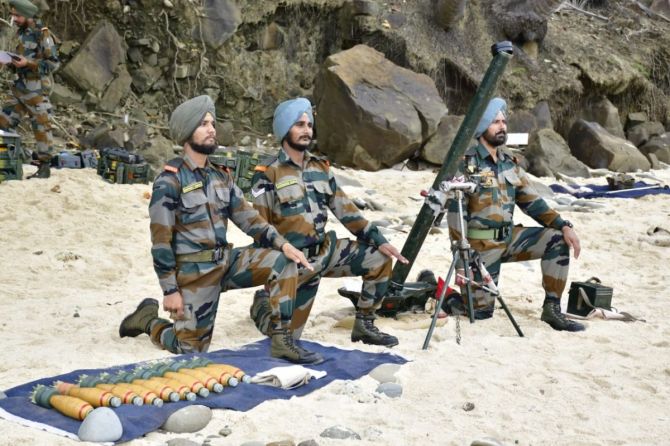The Indian Army has been monitoring the Israel-Hamas conflict so that its soldiers are trained to tackle similar situations on the border if terrorist attacks are launched from Pakistan or any other country, the general heading the Army Training Command said here on Tuesday.

"We are also closely watching the Russia-Ukraine war for three years to know how the drones and new technologies are impacting the war," Lt Gen Manjinder Singh, General Officer Commanding-in-Chief of Shimla base Army Training Command also said.
Addressing mediapersons after the investiture ceremony of ARTRAC, Singh said the Army has to understand and study these scenarios so that it is prepared if it has to undergo a similar situation tomorrow.
So the training content imparted to soldiers and field army is made accordingly to prepare them for such contingencies, he said.
"The Israel-Hamas war is a "classic case where we may also be impacted by similar situations on our borders with Pakistan or another country with terrorist attacks", so military training has to be relevant, Lt gen Singh said.
"War is a dynamic and evolving process and what wins you the last war may not be very good to win the next war and when economy evolves, threats also evolve. It is for the military commanders to be aware about it," he added.
ARTRAC is unique in nature and different from the other six operational Commands of the Indian Army, mandated to ensure operational preparedness through institutionalised training in the Army, a statement issued here said.
With 34 training establishments under it pan-India reach, the ARTRAC encompasses conceptualisation and implementation of training in 8 specialised fields covering a wide spectrum to include Agniveer training, officers' pre-commission training, combat arms and combat support arms training, technical, logistic, specialist and leadership training, it said.
Over the time, the Indian Army has not only become self-reliant with 90 percent of its requirements being met indigenously but defence equipment worth Rs 35,000 crore has also been exported, Singh said.
"We also focus on training the foreign students who come to India and send our officers and students abroad for training," he said.
"We have 11 mobile training teams deployed in friendly foreign countries on request of their embassies. We are subscribing for 22 foreign courses in eight foreign countries and also offering 273 courses to 74 foreign countries to learn best practices," he added.











 © 2025
© 2025